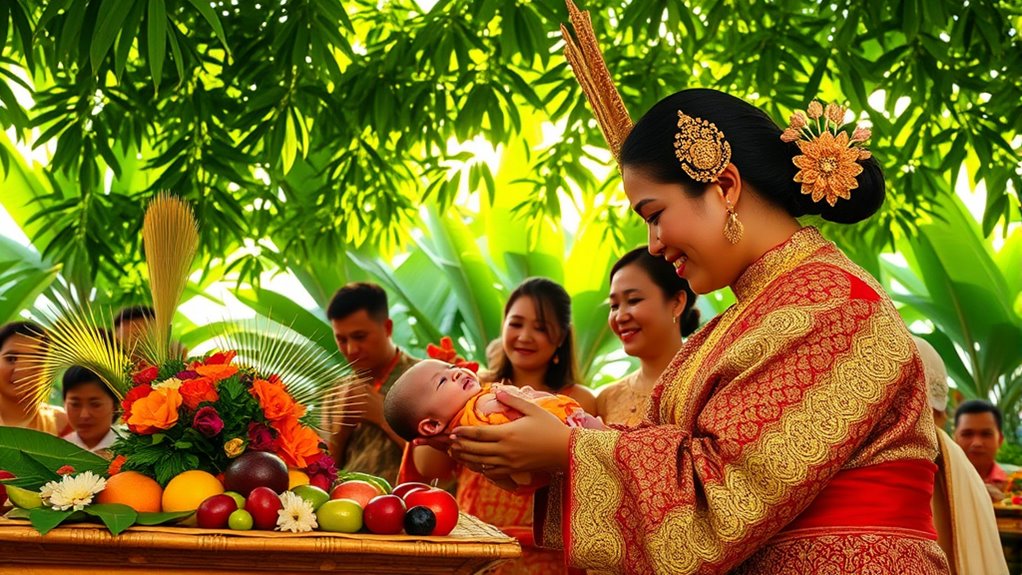In Bali, baby blessings are powerful ceremonies that celebrate a child’s spiritual connection, community support, and hopes for their well-being. You’ll see offerings like flowers and rice, prayers by priests, and rituals like sprinkling holy water. Family and neighbors gather to offer blessings, reinforcing bonds and cultural values. These ceremonies symbolize protection, growth, and spiritual harmony for the child. To explore more about this meaningful tradition, keep discovering Bali’s rich cultural practices.
Key Takeaways
- Baby blessings in Bali symbolize community hopes for health, happiness, and spiritual growth for the child.
- Rituals include offerings, prayers, holy water sprinkling, and sacred objects to invoke divine protection.
- Family and community participation reinforce cultural identity, support, and spiritual bonds during the ceremony.
- Offerings like rice, flowers, and water represent purity, growth, and prosperity for the child’s future.
- Attending a Bali baby blessing offers insight into the island’s rich spiritual traditions and communal values.
The Significance of Baby Blessings in Balinese Culture
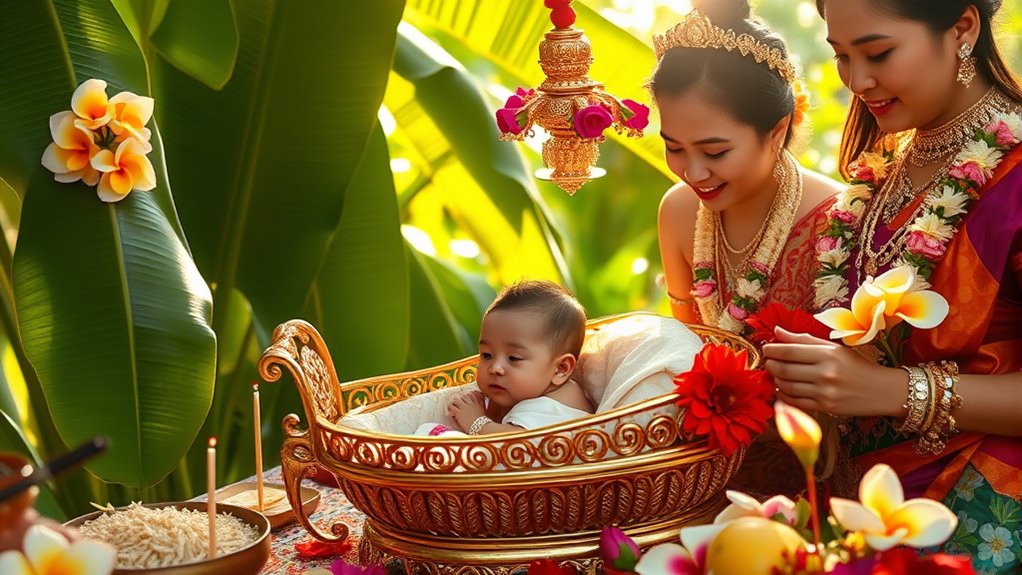
In Balinese culture, baby blessings are more than just a ceremonial tradition; they are a vital way to guarantee the child’s well-being and spiritual protection. These blessings symbolize the community’s collective hope for the child’s health, happiness, and spiritual growth. They serve as a sacred rite, connecting the child to ancestral spirits and divine forces. By participating in these blessings, you help establish a foundation of spiritual safety and cultural identity. It’s not just about honoring the child but also about invoking blessings that shield them from negative energies and ensure a prosperous future. This deeply rooted practice reflects the Balinese belief in the importance of spiritual harmony, which influences every aspect of the child’s life from an early age.
Traditional Rituals and Ceremonial Elements
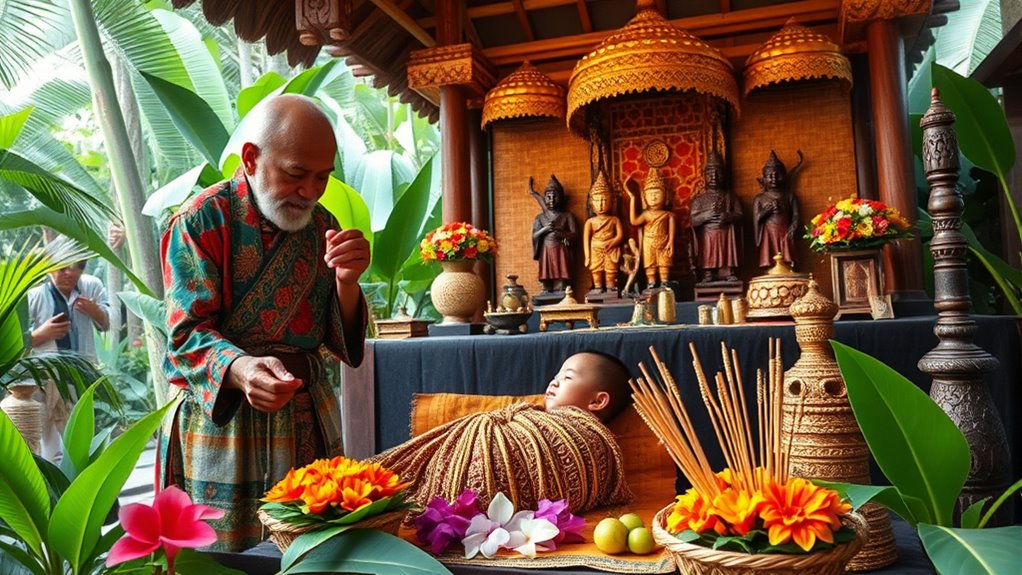
During a Balinese baby blessing, various traditional rituals and ceremonial elements come together to create a meaningful and spiritually charged experience. You’ll notice offerings called “canang sari,” small baskets filled with flowers, rice, and incense, symbolizing gratitude and protection. A priest or spiritual leader conducts prayers and mantras, invoking blessings from the gods. The baby is often gently sprinkled with holy water, believed to purify and safeguard them. Sacred objects, such as a tiny coconut or rice grains, may be placed near the baby to invite prosperity and health. Incense sticks and candles are lit, creating an atmosphere of reverence and divine presence. These rituals emphasize purity, protection, and the connection between the spiritual and physical worlds during the ceremony.
Role of Family and Community in the Ceremony

Family and community members actively participate in the baby blessing, viewing the ceremony as a collective expression of love, support, and spiritual responsibility. Your presence reinforces the child’s connection to their cultural roots and the community’s commitment to their well-being. During the ceremony, relatives and neighbors gather closely, offering prayers and blessings that symbolize unity and shared hopes for the child’s future. You might witness elders guiding younger family members, emphasizing respect and tradition. Everyone plays an essential role, from preparing offerings to participating in rituals, ensuring the ceremony’s success. This collective effort strengthens bonds, reminding you that the child’s future is a shared journey, supported by a caring community rooted in Balinese values and spiritual beliefs. Recognizing the importance of cultural traditions helps preserve these meaningful practices for future generations.
Symbolism and Blessings Offered to the Child
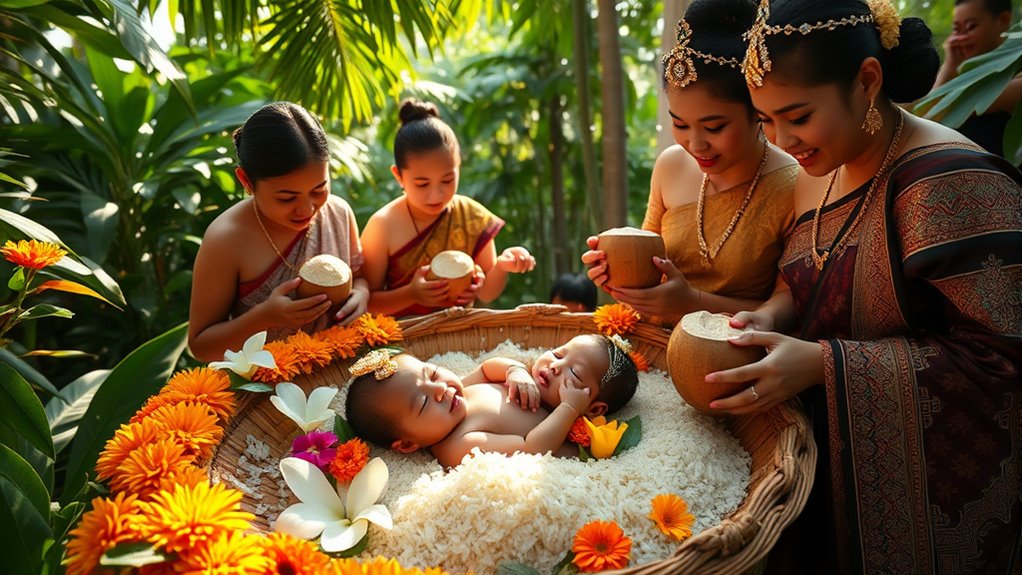
At the heart of the Balinese baby blessing lies a rich tapestry of symbolism and heartfelt blessings, each carefully chosen to nurture the child’s spiritual and physical well-being. You’ll notice offerings like rice, flowers, and water, symbolizing purity, growth, and life’s flow. Blessings invoke protection, health, and prosperity, often spoken aloud by the priest or family elders. They may include prayers for the child’s safety and good fortune, emphasizing harmony with nature and the divine. The use of sacred objects and rituals reinforces the child’s connection to spiritual forces, ensuring they are protected and guided. Every element in the ceremony is meaningful, designed to imbue the child’s life with positive energy, blessings, and a deep sense of spiritual security. Incorporating ethical leadership principles, the ceremony also underscores the importance of nurturing moral values and integrity in the child’s upbringing.
Experiencing a Baby Blessing During Your Visit to Bali
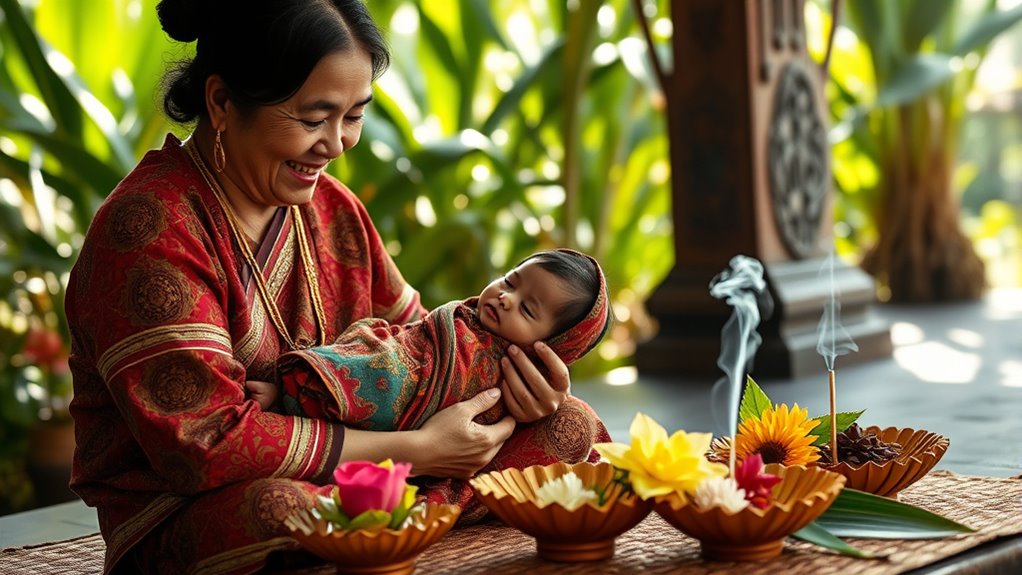
Experiencing a baby blessing in Bali offers a unique glimpse into the island’s rich spiritual traditions. When you participate, you’ll often witness colorful ceremonies filled with chanting, offerings, and rituals performed by local priests or family members. These ceremonies typically involve sprinkling blessed water on the baby, presenting symbolic gifts, and prayers for health and happiness. As a visitor, you’re welcome to observe and even take part in certain rituals, which deepens your understanding of Balinese culture. Be respectful of customs, dress modestly, and follow guidance from local hosts. Attending a blessing allows you to connect with Bali’s spiritual heart, witnessing firsthand how community, faith, and traditional rituals intertwine to celebrate new life.
Frequently Asked Questions
How Do Baby Blessings Differ Across Various Balinese Villages?
You’re curious about how baby blessings vary across Balinese villages. Each village has its own unique traditions and rituals, influenced by local customs and beliefs. Some villages emphasize specific offerings, prayers, or ceremonies, while others incorporate distinct symbols or music. Despite these differences, all aim to bless the child with good health, protection, and prosperity, reflecting the rich diversity of Balinese culture and community values.
Are There Specific Age Milestones for Performing a Baby Blessing?
You wonder if there are specific age milestones for a baby blessing, right? In Bali, these ceremonies often occur at key milestones, like the newborn stage or when a child reaches certain ages, such as three or six months. The timing varies by village and family tradition, creating a sense of anticipation. This ritual marks an important spiritual moment, reinforcing community bonds and blessing the child’s future, making each milestone uniquely meaningful.
Can Visitors Participate in the Blessing Ceremony?
You can often participate in a blessing ceremony if you’re invited or welcomed by the family. It’s respectful to observe local customs and ask for permission before joining. Engaging in the ritual shows your appreciation for the culture, but always follow the lead of the hosts. Your participation can be a meaningful experience, as long as you approach it with respect and understanding of their traditions.
What Are Common Gifts Given During Balinese Baby Blessings?
Imagine walking into a Bali baby blessing and being handed a gift so meaningful, it feels like holding a piece of paradise. You might bring colorful clothes, gold jewelry, or even tiny offerings of rice and flowers. Sometimes, family members give symbolic items like candles or rice to bless the baby’s future. Your thoughtful gift joins a sea of love and blessings, making the ceremony unforgettable for everyone involved.
How Has the Tradition of Baby Blessings Evolved in Modern Bali?
You notice that in modern Bali, baby blessings have become more personalized and inclusive. While traditional rituals like offerings and prayers remain, families now incorporate contemporary elements such as photos, special clothing, or community gatherings. You might see more elaborate celebrations or social media sharing, reflecting Bali’s blend of tradition and modernity. This evolution allows families to honor their cultural roots while embracing contemporary expressions of joy and community support.
Conclusion
As you witness a Balinese baby blessing, you realize it’s more than just a ceremony—it’s a beautiful reminder of how deeply family, faith, and community intertwine. Sometimes, it’s in these shared traditions that you find unexpected connections, feeling the warmth and blessings surround you. In Bali’s rich culture, these moments aren’t just about the baby; they’re about embracing life’s blessings, reminding you that sometimes, the most meaningful experiences come when you least expect them.
